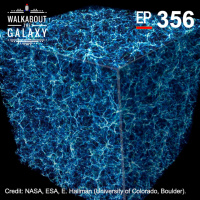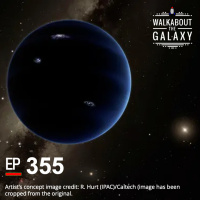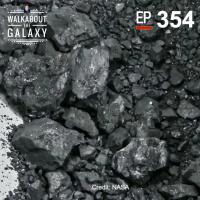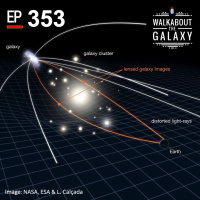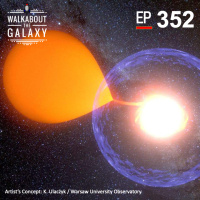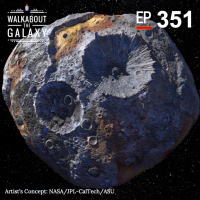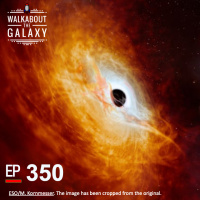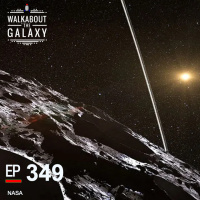Walkabout The Galaxy
- Autor: Vários
- Narrador: Vários
- Editora: Podcast
- Duração: 238:03:23
- Mais informações
Informações:
Sinopse
An irreverent and informative tour of the latest, greatest and most interesting discoveries in astronomy.
Episódios
-
The Low Down on Big G and the Young Moon of Dinkinesh
08/05/2024 Duração: 45minNASA's Lucy mission discovered a surprising moon of the small asteroid Dinkinesh on its way to the orbit of Jupiter. New studies of that moon, a contact binary, suggest it may have a surprisingly young age. Meanwhile, cosmologists continue to wrestle with various seemingly contradictory measurements. One model suggests a modification to that old Physics 1 standby, the gravitational constant (or is it?) G. Join us for all the astronomical news near and far, including space news updates and trivia.
-
Dark Matter Wins Again
01/05/2024 Duração: 45minA clever test of dark matter and an alternative theory of gravity to explain the motions of stars around galaxies results in another check in the win column for dark matter. Simulations with the modified model of gravity failed to explain the motions in the inner regions of galaxies. Meanwhile the search for a hypothesized large object in the distant reaches of our solar system has so far come up empty suggesting that it may be larger and more distant than previously thought. Join us for all the intriguing and exciting space news in the universe!
-
Surprises from Bennu and the Milky Way
03/04/2024 Duração: 41minAnalysis of the samples returned from the asteroid Bennu have revealed surprising assemblages of minerals that put new constraints on the origin of the solar system. And once Top Quark Jim Cooney stops giggling, he tells us about the discovery of an itsy-bitsy galaxy, if you can call it that, orbiting the Milky way. It has only dozens of stars, plus, probably some dark matter. Join us for these surprising discoveries, space news updates, variable star trivia, and a generally good time.
-
The Dark Ages of the Universe
27/03/2024 Duração: 41minWe peer back in time both to the murky history of our own solar system and to the dark ages of the universe. The JWST has confirmed that dwarf galaxies were the first to illuminate the universe, putting an end to the dark ages that followed the cooling after the big bang. In our own corner of the universe, new research highlights how nearby stars can lead to dramatic changes in our planet’s climate by affecting the Earth’s orbit. Join us for all this, nerd news, space news, and eclipse trivia.
-
A Nova Visible this Year?
20/03/2024 Duração: 39minOne of only a handful of recurrent novas, white dwarf stars that undergo a periodic explosive brightening as they accrete material from a neighboring star, is showing signs that it may be ready to blow sometime in 2024! Visible in the northern hemisphere, T CrB may become visible to the naked eye for a few days this year, repeating a cycle that occurs roughly every 80 years. Closer to home, new analysis of structures and composition on Mars' Tharsis bulge reveal what may be a previously unknown and now-extinct volcano. Join us for explanations, space news, spaceflight trivia and more.
-
Psyche Revisited and Two Giant Black Holes
06/03/2024 Duração: 44minThe presumed metallic asteroid Psyche gets a new look before the spacecraft of the same name gets there in 2029, and it reveals different spectral characteristics than were observed in previous studies. We discuss the mystery of metallic asteroids and what we might see at Psyche. Top quark educates us about the largest binary black hole system, with two supermassive black holes orbiting each other from an ancient galactic collision. Join us for all this, space news, and tiny rocket trivia.
-
The Tiniest Ocean World and the Brightest Quasar
28/02/2024 Duração: 45minSaturn's so-called Death Star moon Mimas may harbor a global subsurface ocean based on analysis of Cassini data of the tiny moon's orbit and rotation. And in the distant universe, what was previously thought to be a run-of-the-mill star in our own galaxy turns out to be a quasar thousands of times brighter than our entire galaxy itself. Join us on our 350th episode for breakthroughs in astronomy near and far, space news, sci-fi trivia, and more.
-
Space Oddities in the Solar System
21/02/2024 Duração: 41minWater molecules have been observed on the surface of an asteroid for the first time, and new studies help explain some of the odd behavior of planetary ring systems, including why they even exist around small objects in the outer solar system. Join us for a clear and fun explanation, the latest from Mars, upcoming missions, space trivia and more.
-
When Will We Walk on Mars?
07/02/2024 Duração: 41minIn this special episode recorded live at MegaCon Orlando 2024, we are joined by NPR space reporter Brendan Byrne to take a close look at where we are in the mission to get people to the red planet. We take a look at the next steps in the Artemis program, and the history and future of robotic exploration of Mars. Find out when we will walk on Mars, where the best places to walk are, and we answer a listener question on the three body problem.
-
Large Cosmological Structures and JWST Spies a Binary TNO
31/01/2024 Duração: 37minThere's another claim for a violation of the cosmological principle - that all parts of the universe are basically the same on large scales - but Top quark Jim Cooney explains all is not lost for the standard model of the universe, and more observations are needed. The JWST is providing amazing observations near and far, and has now separately measured the composition of two orbiting trans-Neptunian objects (TNOs), confirming that they are made of the same stuff. We explain the implications of this together with the latest space news, a time loop stumper, and walkabout trivia.
-
Trojan Mysteries and Titan Snowbergs
24/01/2024 Duração: 49minStrange disappearing islands in the hydrocarbon lakes of Saturn's giant moon Titan may be fluffy icebergs of hydrocarbon snow. If you're on Titan, definitely don't eat the snow, yellow or not. As the Lucy mission heads towards the Trojan asteroids, questions remain about how this strange population of objects formed. We catch up with all the space news, a time travel stumper, and lunar exploration trivia.
-
Agents of Chaos and Iron Snow
10/01/2024 Duração: 42minWhat role has Jupiter played in the existence of our warm and cosy home planet? Has it been bravely using its gravity to keep the inner solar system calm, or did we luck out and escape getting hurtled out of the solar system or dashed to bits in a giant collision? We’ll discuss new research that explores exoplanetary systems with multiple large planets and whether habitable planets can co-exist with them. And within our own planet we learn about iron snow at the core mantle boundary and its effects on our magnetic field. Join us for all this cool stuff, plus space news and trivia.
-
Globular Clusters and Life in Enceladus
21/12/2023 Duração: 43minNew analysis of Cassini data suggests more complex hydrocarbons are part of Enceladus's global sub-surface ocean. We discuss the prospects for life on this tiny moon. The JWST continues to deliver scientific bonanzas, now providing direct observations of globular clusters in very distant galaxies, helping us understand these enigmatic and ancient structures. Join us to explore these mysteries and for space news and special down quark holiday-themed space trivia.
-
Pluto Cryovolcano and a Cosmological Supervoid
13/12/2023 Duração: 42minAt Pluto’s frigid temperatures, even what we breathe is frozen. This can give rise to unusual cryovolcanism, and new research suggests a super cryovolcano tens of kilometers across on the ninth planet (yes, we went there). Speaking of super things, we also review the argument that we are located in a cosmological supervoid and whether than can explain some of the mysteries surround the Hubble constant. Join us for all that, space news, trivia and more.
-
Mysterious Cosmic Ray and Martian Airglow
06/12/2023 Duração: 46minThe second most energetic cosmic ray (really a particle) ever observed smashed into the Earth a couple of years ago, raising more questions about the origins of these incredibly energetic particles. Solar wind particles meanwhile smash into the planets, and now a green glow from Mars' atmosphere has been observed by one of the many spacecraft exploring the red planet. We also discuss a surprising exoplanet discovery, moon trivia, space news and more.
-
Ethical Dilemmas in Space Exploration
22/11/2023 Duração: 45minThe astroquarks are joined by Dr. Erika Nesvold, astrophysicist and author of “Off Earth: Ethical Questions and Quandaries for Living in Outer Space” to explore some of the surprising problems people need to think about when going to space. We’re busy littering already, but that’s just the tip of the asteroid. Join us for a discussion of some of the trickier issues of space exploration, space news, and gravitational wave trivia. The only place you can find that lineup is on Walkabout the Galaxy.
-
The Origin of Supermassive Black Holes
15/11/2023 Duração: 41minJWST data confirm early formation of supermassive black holes, less than 500 million years after the big bang. This early formation suggests these monsters start off very large and form with the initial formation of the galaxy. We also take a closer look at the exciting results from the Lucy spacecraft's flyby of the asteroid Dinkinesh and its surprising moon. Join us for all this, space news, and top quark trivia.
-
Dinky and the S8 Tension
08/11/2023 Duração: 51minThe Lucy spacecraft had its first asteroid encounter, revealing Dinkinesh to be a binary asteroid. In cosmology, a new simulation with a terrible acronym leaves the "S8 Tension" intact. Models of the expansion of the universe starting with our observations of the cosmic microwave background are in disagreement (tension) with observations of the actual distribution of superclusters of galaxies. Are there errors that haven't been uncovered, or perhaps new physics? Join us for our thoughts on these and other news in space, and some literally mind-blowing trivia.
-
The Surprising Interiors of Mars and Venus
01/11/2023 Duração: 47minNew research suggests that Venus, Earth’s twin gone bad, may have started off with tectonic plate activity, like Earth. This will help us understand the evolution of Earth-like planets and why they become hothouses like Venus. Our other planetary next-door neighbor, Mars, may have a deep molten magma ocean, revealed thanks to a fortuitous meteoroid impact on the planet whose shaking was recorded by Mars Insight. Join us for these insights, space news, and more.
-
Detecting ETs and Intergalactic Baryons
25/10/2023 Duração: 46minFast Radio Bursts are back, this time providing a crucial measurement of the amount of normal matter in the universe. Top quark Jim Cooney explains how the interaction of light from very distant gamma ray bursts reveals the otherwise invisible matter sprinkled in the intergalactic void. Somewhat closer to home, JWST is providing tantalizing glimpses of the composition of extrasolar planets, a technique that may one day discover alien life. Join us for these and other discoveries, space news, and podcast trivia.

